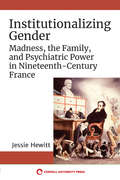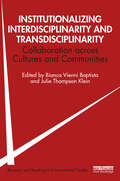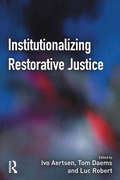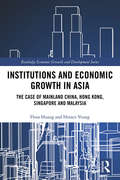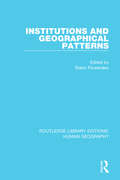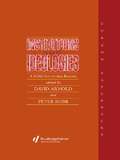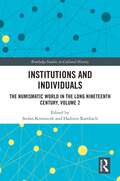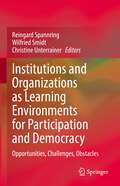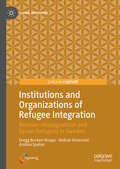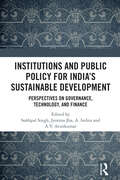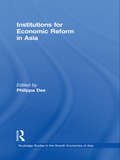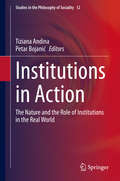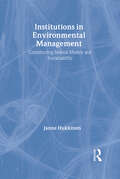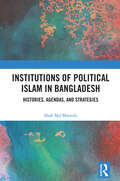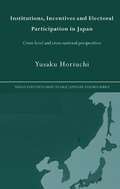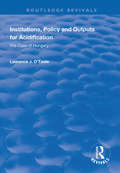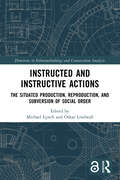- Table View
- List View
Institutionalizing Gender: Madness, the Family, and Psychiatric Power in Nineteenth-Century France
by Jessie HewittThis book examines the influence of gender and family values on the development of nineteenth-century French psychiatry.
Institutionalizing Interdisciplinarity and Transdisciplinarity: Collaboration across Cultures and Communities (Research and Teaching in Environmental Studies)
by Bianca Vienni Baptista and Julie Thompson KleinInstitutionalizing Interdisciplinarity and Transdisciplinarity fills a gap in the current literature by systematizing and comparing a wide international scope of case studies illustrating varied ways of institutionalizing theory and practice. This collection comprises three parts. After an introduction of overall themes, Part I presents case studies on institutionalizing. Part II focuses on transdisciplinary examples, while Part III includes cross-cutting themes, such as funding, evaluation, and intersections between epistemic cultures. With expert contributions from authors representing projects and programs in Asia, Africa, Australia, Europe, Russia and South Caucuses, Latin and North America, this book brings together comparative perspectives on theory and practice, while also describing strategies and models of change. Each chapter identifies dimensions inherent in fostering effective and sustainable practices. Together they advance both analysis and action-related challenges. The proposed conceptual framework that emerges supports innovative practices that are alternatives to dominant academic cultures and approaches in pertinent disciplines, fields, professionals, and members of government, industry, and communities. Applying a comparative perspective throughout, the contributors reflect on aspects of institutionalizing interdisciplinarity and transdisciplinarity as well as insights applicable to further contexts. This innovative volume will be of great interest to students, scholars, practitioners, and members of organizations promoting and facilitating interdisciplinary and transdisciplinary research.
Institutionalizing Intersectionality
by Judith Squires Andrea Krizsan Hege SkjeieAn exploration of the ways that multiple inequalities are being addressed in Europe. Using country-based and region-specific case studies it provides an innovative comparative analysis of the multidimensional equality regimes that are emerging in Europe, and reveals the potential that these have for institutionalizing intersectionality.
Institutionalizing Restorative Justice
by Tom Daems Luc Robert Ivo AertsenThis new book aims to explore the key issues and debates surrounding the question of the incorporation and institutionalisation of restorative justice within existing penal and criminal justice systems, an increasingly pressing issue given the rapid spread of restorative justice worldwide at both national and international levels. In doing so it aims to build bridges between those concerned with the practical institutionalisation of restorative justice on the one hand, and those engaged in more theoretical aspects of penal development and analysis on the other. It offers conceptual tools and a theoretical framework to help make sense of these developments, reflecting expertise drawn from analysis of developments in Europe, North America and Australasia.
Institutionelle und professionsbezogene Zugänge zum Kinderschutz: Prävention – Kinderschutz – Kinderrechte (Edition Centaurus - Perspektiven Sozialer Arbeit in Theorie und Praxis)
by Elke Schierer Annette Rabe Birgit GronerDas Thema Kinderschutz wird in diesem Band multiperspektivisch auf Ebene der Prävention, des Kinderschutzes per se und der Kinderrechte betrachtet und diskutiert. Hierbei spielen institutionelle und professionsbezogene Zugänge und Entwicklungen eine wesentliche Rolle. Das Aufwachsen von Kindern und Jugendlichen in der heutigen Gesellschaft geschieht in einer Spätmoderne, die gekennzeichnet ist von gesellschaftlichen Transformationsprozessen in verschiedenen Bereichen. Die Veränderungen in den Teilsystemen, zu denen Kinder und Jugendliche gehören wie Familien und Institutionen des öffentlichen Lebens, sind interdependent mit anderen Teilsystemen. Die Subjektorientierung und Anerkennung von Kinderrechten darf nicht darüber hinwegtäuschen, dass diese Verschränkung der geteilten Verantwortung im Kontext der Transformationsprozesse ein gelingendes Aufwachsen nicht an allen Orten und für alle Kinder und Jugendlichen ermöglicht. Die Beiträge des Bandes beziehen sich auf diese Prozesse und versuchen, dem Thema Kinderschutz in der Gesamtheit gerecht zu werden.
Institutions Inc.
by Peter Walgenbach Elke WeikInstitutions Incorporated draws together aspects of human and organizational corporeality and links them to institutions. Throughout European anthropology and culture the body has been conceptualized as the 'dark side' to soul and reason. This book explores the 'dark side' of institutions, their materiality and the bodily involvement of their users, in an environment where perfection is measured in intangible entities, notably reason and will. This innovative collection takes a closer look at the interplay of the symbolic and the material, and the triad of institutions, bodies and corporations. This exciting research examines what the tangible, 'dark side' of institutions means both for those who live in them, and those who study them.
Institutions Inc.
by Peter Walgenbach Elke WeikInstitutions Incorporated draws together aspects of human and organizational corporeality and links them to institutions. Throughout European anthropology and culture the body has been conceptualized as the 'dark side' to soul and reason. This book explores the 'dark side' of institutions, their materiality and the bodily involvement of their users, in an environment where perfection is measured in intangible entities, notably reason and will. This innovative collection takes a closer look at the interplay of the symbolic and the material, and the triad of institutions, bodies and corporations. This exciting research examines what the tangible, 'dark side' of institutions means both for those who live in them, and those who study them.
Institutions and Economic Growth in Asia: The Case of Mainland China, Hong Kong, Singapore and Malaysia (Routledge Economic Growth and Development Series)
by Flora Huang Horace YeungThis book explores the role of institutions in economic growth, looking in particular at specific Asian countries and at particular cities within those countries. It considers a wide range of factors besides institutions, including the law, cultural factors and overall government arrangements. The differences between the countries studied are highlighted, and the impact of these differences assessed: the impact of English common law on arrangements in Hong Kong, Singapore and Malaysia; sharia law in Malaysia; the differing lengths of time of colonial rule; the extent to which Chinese family businesses control an economy. Also studied are the degree to which the law is effectively applied, and a range of other social, economic and cultural factors. The book’s conclusions as to which factors have the greatest impact will be of considerable interest to economists of Asia and those interested in economic growth more widely.
Institutions and Geographical Patterns (Routledge Library Editions: Human Geography #7)
by Robin FlowerdewAn increasing amount of work in many aspects of human geography is concerned with the effects caused by different types of institutions. Included in this book, originally published in 1982, is material from Britain, Ameican and Europe and it is shown that differences in institutional powers in these places, especially those vested in the State, relate directly to their own particular urban and environmental policies and problems. Each chapter, written by an expert on this subject, considers key institutions in a number of fields and draws conclusions about how this ‘institutionalist’ approach can be used by geographers.
Institutions and Ideologies: A SOAS South Asia Reader
by David Arnold Peter RobbInformative, timely and accessible introduction to the study of South Asia by leading scholars in the field.
Institutions and Individuals: The Numismatic World in the Long Nineteenth Century, Volume 2 (Routledge Studies in Cultural History)
by Stefan KrmnicekThis second part of the 2 volume collection comprises a collection of essays in English by leading scholars on 19th century institutions and individuals presenting the latest developments in international scholarship on the numismatic world in the long 19th century. In the 19th century, developments in the study and collection of coins set the cornerstone for modern numismatics. This volume comprises a collection of essays in English by international leading scholars that highlight significant figures of 19th century research and the state of the numismatic trade in their time. Centering around collectors and scholars of ancient, medieval, modern, as well as on non-Western coinage and medals against the backdrop of the political, cultural, economic, and social changes of the era, this book presents the latest scholarship on numismatics’ contribution to the cultural history of the 19th century. This volume is essential for students and scholars alike interested in 19th century history and the history of coins.
Institutions and Organizations as Learning Environments for Participation and Democracy: Opportunities, Challenges, Obstacles
by Wilfried Smidt Reingard Spannring Christine UnterrainerThis book discusses opportunities and limitations to democratic participation in institutions and organizations across the life course. It demonstrates that democratic participation is not something that is learned once and for all and applied in formal political settings, but something that is lived every day throughout life in various contexts. Institutions and organizations frame human lives and strongly determine the ability to participate and co-determine their communities. They are places for learning, deliberation and the development of the common good. The book conceptually and empirically analyses the potential of democratic participation within various institutions. The contributions range from early childhood institutions, schools, youth programs, workplaces, and vocational education to cultural organizations and nursing homes for the elderly. The book thereby provides a cross-sectional and interdisciplinary knowledge base to inspire future research and practical efforts to promote democratic participation within and across institutions around the world.
Institutions and Organizations of Refugee Integration: Bosnian-Herzegovinian and Syrian Refugees in Sweden (Global Diversities)
by Gregg Bucken-Knapp Vedran Omanović Andrea SpeharThis book examines the integration experiences of refugees to Sweden from Bosnia and Herzegovina (1992-1995), and more recently from Syria (2014-2018) - two of the largest-scale refugee movements in Europe for the last thirty years. It focuses on refugees’ interactions with key institutions of integration including language training, civic orientation, validation of previous educational experience, organizations and multiple labour market initiatives targeting refugees. Drawing on interviews with the refugees themselves, it offers a nuanced analysis of how the institutions of integration operate on a daily basis, and the effects they have on the lives of those who take part in them. The authors’ comparative approach highlights the particularities of each refugee movement while also revealing developments and persistent issues within institutions of integration in the intervening years between the Bosnian-Herzegovinian and Syrian conflicts. Its conclusion, which situates the Swedish case within the broader European context, demonstrates the wider significance of this timely study. It will provide a valuable resource for policymakers in addition to students and scholars of migration studies, social policy, and public policy and business administration.
Institutions and Public Policy for India’s Sustainable Development: Perspectives on Governance, Technology, and Finance
by Sukhpal Singh Jyotsna Jha A. Indira A. V. ArunkumarSustainable development has emerged as an overarching concern globally. Given the challenges of climate change, national economies, especially in the developing world, face unsustainable levels and patterns of growth and development. This volume looks at how India’s sustainable development has progressed through institutional changes and public policy discourse. It studies the three pillars of sustainability – technology, governance, and finance. The authors examine whether institutions have been able to work towards becoming inclusive and participatory and whether public policy can remain relevant and agile in a fast-changing world to ensure sustainable development.Written in honour of Professor Vinod Vyasulu, an erudite economist with wide-ranging interests, this volume will be of interest to academics and practitioners engaged with issues of development, policy, institutions, and technology in the fields of Economics, Sociology, Development Studies, Public Policy, and South Asian Studies.
Institutions for Economic Reform in Asia (Routledge Studies in the Growth Economies of Asia)
by Philippa DeeIn the same way that no economy starts out with the best set of economic policies, no economy starts out with the best institutions to support the policy-making process. Instead, they inherit institutions that reflect their own unique culture and history. The task of structural reform has to be addressed, therefore, in the context of domestic economic and political institutions and processes. Examining the nature of structural economic reform and the institutional circumstances in which it succeeds or is inhibited, this volume is less about the content of structural reform and more about how to get there. The chapters develop principles governing the types of institutions that are likely to assist the structural reform process, and then examine the application of those principles within a number of case studies. Finally, the volume presents some ideas about how regional cooperation could help to build and support those institutions that in turn support domestic structural reforms. Consisting of theoretical chapters and country specific case studies, this book draws on experience with structural reform across a range of Asian economies at different stages of economic development. As such it will be of interest to students and scholars of Asian Economics and Development Economics.
Institutions in Action: The Nature and the Role of Institutions in the Real World (Studies in the Philosophy of Sociality #12)
by Tiziana Andina Petar BojanićThis edited volume presents the social ontology of institutions. It questions what institutions are, what features and properties institutions have and what kinds of institution are present in the social world. The book answers these questions from both a speculative and an applied approach, it argues for a specific definition of institutions as a rule-based equilibria, as collective epistemic agent that is characterized by meaning, principles and power and as product of a We-mode and an imposition of a function. This book started from the interdisciplinary conference Playing by the Rules in Rijeka and contains contributions from Philosophy, Sociology and Economy.Institutions in Action is the first book to offer a comprehensive overview of the many different aspects and accounts about the social ontology of institutions. This much needed book presents researchers a very wide state of the art about the topic of institution by presenting the many differences that emerge in comparing the different positions.
Institutions in Environmental Management: Constructing Mental Models and Sustainability (Routledge/EUI Studies in Environmental Policy #Vol. 4)
by Janne HukkinenThis work explores the difficulties of solving contemporary environmental problems within existing global institutions. It questions guidelines set out in recent influential policy reports, and suggests new agendas for sustainability, industrial ecology, and institutional reform. Including case studies from the USA, Europe and China, this book investigates a wide range of environmental problems presently confronting experts worldwide.
Institutions of Political Islam in Bangladesh: Histories, Agendas, and Strategies
by Shafi Md MostofaThis book examines the socio-political histories, religio-political agendas and politico-militant (and for some, non-violent) strategies of institutions of political Islam in Bangladesh. Focusing on Jammat-e-Islami, Hefazet-e-Islam, Jammatul Mujahedeen Bangladesh (JMB), Ansar al Islam, Neo-Jammatul Mujahedeen Bangladesh (Neo-JMB), Tablighi Jamaat, and Islami Andolon Bangladesh, it shows how these groups are key actors in the securitization of the postcolonial socio-cultural, economic, and political histories (and future) of Bangladesh.The volume illustrates the complex ways in which every day lived experiences of peoples of Bangladesh, and securitized political and cultural pathways of state governance have shaped and impacted the histories and activities of these groups, and the strategies and agendas of these groups to gain political and socio-religious legitimacy within (and sometimes, beyond) the secularized cultural landscapes of Bangladesh. Moreover, the book argues that even though these Islamist groups bear the same agenda of transforming Bangladesh into an Islamic state, their strategies are different and unique. It also discusses the connections of some of these groups to other transnational institutions of political Islam and extremist groups such as Al-Qaeda and the Islamic State (IS).This book will be a major intervention in the field of politics, religion, and South Asian studies.
Institutions, Emotions, and Group Agents
by Hans Bernhard Schmid Anita Konzelmann ZivThe contributions gathered in this volume present the state of the art in key areas of current social ontology. They focus on the role of collective intentional states in creating social facts, and on the nature of intentional properties of groups that allow characterizing them as responsible agents, or perhaps even as persons. Many of the essays are inspired by contemporary action theory, emotion theory, and theories of collective intentionality. Another group of essays revisits early phenomenological approaches to social ontology and accounts of sociality that draw on the Hegelian idea of recognition. This volume is organized into three parts. First, the volume discusses themes highlighted in John Searle's work and addresses questions concerning the relation between intentions and the deontic powers of institutions, the role of disagreement, and the nature of collective intentionality. Next, the book focuses on joint and collective emotions and mutual recognition, and then goes on to explore the scope and limits of group agency, or group personhood, especially the capacity for responsible agency. The variety of philosophical traditions mirrored in this collection provides readers with a rich and multifaceted survey of present research in social ontology. It will help readers deepen their understanding of three interrelated and core topics in social ontology: the constitution and structure of institutions, the role of shared evaluative attitudes, and the nature and role of group agents.
Institutions, Incentives and Electoral Participation in Japan: Cross-Level and Cross-National Perspectives (Nissan Institute/Routledge Japanese Studies)
by Yusaku HoriuchiAmerican and European political scientists have claimed that subnational elections almost always record lower voter turnout than national elections. In Japan, however, municipal elections often record considerably higher turnout than national elections, particularly in small towns and villages. Institutions, Incentives and Electoral Participation in Japan theoretically and empirically explores this puzzling 'turnout twist' phenomenon from comparative perspectives. Based on the rational-choice approach, the book hypothesizes that relative voter turnout in subnational vs. national elections is determined by the relative magnitudes of how much is at stake ('election significance') and how much votes count ('vote significance') in these elections.
Institutions, Policy and Outputs for Acidification: The Case of Hungary (Routledge Revivals)
by Lawrence J. O'Toole, JrPublished in 1998, this is an analysis of the impact in Hungary of environmental policy following the Convention of Long Range Trans-boundary Air Pollution (CLRTAP) of the Economic Commission of Europe. The book focuses on central research issues but also analyzes environmental institutions and policy in Hungary more generally. It treats related themes such as the emerging role of the new autonomous local governments, the impact of privatization on acidification and environmental issues in Hungary and offers coverage of the influence of NGO's in democratic Hungary.
Institutions, Technology, and Circular and Cumulative Causation in Economics
by Henning SchwardtThe book investigates the relation between technology and institutions and their mutual influence during processes of development and change and illustrates this on the development process in Argentina after 1946. General and case-study specific policy recommendations are offered.
Instructed and Instructive Actions: The Situated Production, Reproduction, and Subversion of Social Order (Directions in Ethnomethodology and Conversation Analysis)
by Michael Lynch Oskar LindwallThe contributors to this volume take up the theme of instructed and instructive actions. Harold Garfinkel, the founder of ethnomethodology, initiated the study of instructed actions as a way to elucidate the embodied production of social order in real time. Studies of instructions and the actions of following them provide empirical content to the classical theoretical issue of how rules, norms, and other normative guidelines are conveyed, understood, and used for producing social actions and structures. The studies in this volume address novel technologies of instructed action and non-obvious ways in which ordinary actions turn out to be instructive for participants in immediate situations of action and interaction. In some cases, the studies address specialized practical, artistic, and recreational activities, in others they address commonplace modes of action and interaction. In all cases they focus on how the manifest organization of specific activities are organized with and without explicitly formulated instructions. This book will appeal to scholars across the social sciences with interests in ethnomethodological approaches to research by contributing to understandings of how specific actions are instructed and instructive in the circumstances in which they are produced.
Instructed and Instructive Actions: The Situated Production, Reproduction, and Subversion of Social Order (Directions in Ethnomethodology and Conversation Analysis)
by Michael Lynch Oskar LindwallThe contributors to this volume take up the theme of instructed and instructive actions. Harold Garfinkel, the founder of ethnomethodology, initiated the study of instructed actions as a way to elucidate the embodied production of social order in real time. Studies of instructions and the actions of following them provide empirical content to the classical theoretical issue of how rules, norms, and other normative guidelines are conveyed, understood, and used for producing social actions and structures.The studies in this volume address novel technologies of instructed action and non-obvious ways in which ordinary actions turn out to be instructive for participants in immediate situations of action and interaction. In some cases, the studies address specialized practical, artistic, and recreational activities, and in others they address commonplace modes of action and interaction. In all cases, they focus on how the manifest organization of specific activities is organized with and without explicitly formulated instructions.This book will appeal to scholars across the social sciences with interests in ethnomethodological approaches to research by contributing to understandings of how specific actions are instructed and instructive in the circumstances in which they are produced.
Instructions for American Servicemen in Iraq during World War II
by John A. Nagl“American success or failure in Iraq may well depend on whether the Iraqis like American soldiers or not. ” The U. S. military could certainly have used that bit of wisdom in 2003, as violence began to eclipse the Iraq War’s early successes. Ironically, had the Army only looked in its own archives, they would have found it—that piece of advice is from a manual the U. S. War Department handed out to American servicemen posted in Iraq back in 1943. The advice in Instructions for American Servicemen in Iraq during World War II,presented here in a new facsimile edition, retains a surprising, even haunting, relevance in light of today’s muddled efforts to win Iraqi hearts and minds. Designed to help American soldiers understand and cope with what was at the time an utterly unfamiliar culture—the manual explains how to pronounce the word Iraq, for instance—this brief, accessible handbook mixes do-and-don’t-style tips (“Always respect the Moslem women. ” “Talk Arabic if you can to the people. No matter how badly you do it, they will like it. ”) with general observations on Iraqi history and society. The book’s overall message still rings true—dramatically so—more than sixty years later: treat an Iraqi and his family with honor and respect, and you will have a strong ally; treat him with disrespect and you will create an unyielding enemy. With a foreword by Lieutenant Colonel John A. Nagl reflecting on the manual’s continuing applicability—and lamenting that it was unknown at the start of the invasion—this new edition of Instructions for American Servicemen in Iraq will be essential reading for anyone who cares about the future of Iraq and the fate of the American soldiers serving there.
